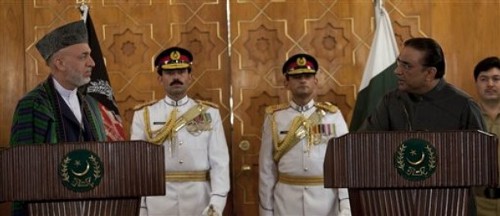
With the U.S.-Pakistani strategic dialogue resuming in Washington today, the relationship could hardly be worse. The trust deficit, already vast, has been stressed to the breaking point by NATO incursions into Pakistan and the subsequent ten-day closure of the major land supply route from Karachi to Afghanistan in retaliation. But there is a grimmer prospect.
Suppose Pakistanis thought like Americans? That prospect could destroy whatever trust and confidence existed between Washington and Islamabad. Consider why.
The Pakistan government understands that the Obama White House believes its civilian government is dysfunctional and could easily fall either through a Supreme Court ruling or a no-confidence vote. It has been told that the Americans regard the political center of power in Pakistan as resting in the hands of Army Chief of Staff General Ashfaq Kayani and Lt-General Ahmed Shuja Pasha, head of Pakistan’s Inter Service Intelligence (ISI) who are independent of civilian control. Furthermore, President Barack Obama does not believe Pakistan can deliver what the U.S. wants most, namely active support in taking down the Haqqani network operating in North Waziristan. Last, the White House has made it clear that to gain further U.S. financial and military assistance, Pakistan’s government must attack corruption and incompetence at its highest levels.
Reversing this analysis, if Pakistani authorities were to think as Americans, how would they assess the situation in Washington?
First, President Obama is politically weak and increasingly irrelevant. His performance rating is almost at the same low levels as Pakistan’s government. A potential rebellion was taking place in the White House with key advisors from Chief of Staff Rahm Emmanuel, National Security Advisor General Jim Jones and Economic Czar Lawrence Summers leaving or being forced out.
Second, Pakistan would predict that Obama and the Democrats will certainly lose control of the House of Representatives and very likely the Senate after the November 2nd elections meaning the US government, already dysfunctional and incapable of producing even a budget or doing the nation’s business will be in total disarray. Obama could be a one-term president.
Third, Pakistan would see real political clout over Pakistan and Afghanistan resting in the Pentagon. Secretary of Defense Robert Gates and Admiral Mike Mullen, Chairman of the Joint Chiefs of Staff are controlling that foreign policy. The president is too weak or too afraid of confronting the military as a new book, “Obama’s War” vividly portrays. And CIA director Leon Panetta likewise dominates intelligence and the secret war against al Qaeda having unseated his nominal boss Admiral Dennis Blair in a coup.
Fourth, while the White House was very critical of Pakistan’s response to the floods, five years after Hurricane Katrina, New Orleans is still far from recovered. The president’s own internal review of the BP oil disaster response is very critical of the administration. And their Department of Homeland Security is still unprepared for future crises. Yet, they criticize Pakistan!
Fifth, Congress still refuses to grant any textile tariff relief that is vital to Pakistan’s economic recovery. The tilt is to India and the $3.5 billion arms sale irrespective of President Obama’s planned visit there are very provocative. Worse was the refusal of the U.S. to raise India’s flagrant and recent human rights violations in its violent crackdown in Kashmir. And despite promises of funding through Kerry Lugar aid and coalition support, only a fraction of the money has been delivered—-pennies when compared with the hundreds of billions of dollars spent in Iraq and Afghanistan—countries with far less strategic importance to the US and about 1/6 of our population.
Sixth, while Pakistan is attacked for corruption and incompetence, the U.S. is just as bad or worse as are Iraq and Afghanistan who seem exempted from criticism. Except, in the U.S. it is called secret campaign funding approved by their Supreme Court. Congress is filled with ethics scandals at the highest levels. The so-called car czar paid a huge fine to avoid charges of wrong doing as an investment banker. And a candidate for the Senate endorses witchcraft. Is this a serious nation?
Finally and according to its own thinking, Pakistan has concluded that the US and its allies are losing in Iraq and in Afghanistan where the strategy of killing as many Taliban as possible will fail.
Pakistani leaders should understand that the next step in improving relations is a serious and full exchange between the two presidents to clear the air. But thinking as Americans, given the weakness of the administration and the Democratic Party, Pakistanis would conclude that the White House cannot deliver. So why not keep the strategic dialogue on hold and after the Republicans win Congress, deal with them?
Hopefully, Pakistanis will not think as we do!
Harlan Ullman is Senior Advisor at the Atlantic Council, Chairman of the Killowen Group that advises leaders of government and business, and a frequent advisor to NATO. Photo Credit: AP Photo.
Image: Zardari500.jpg
